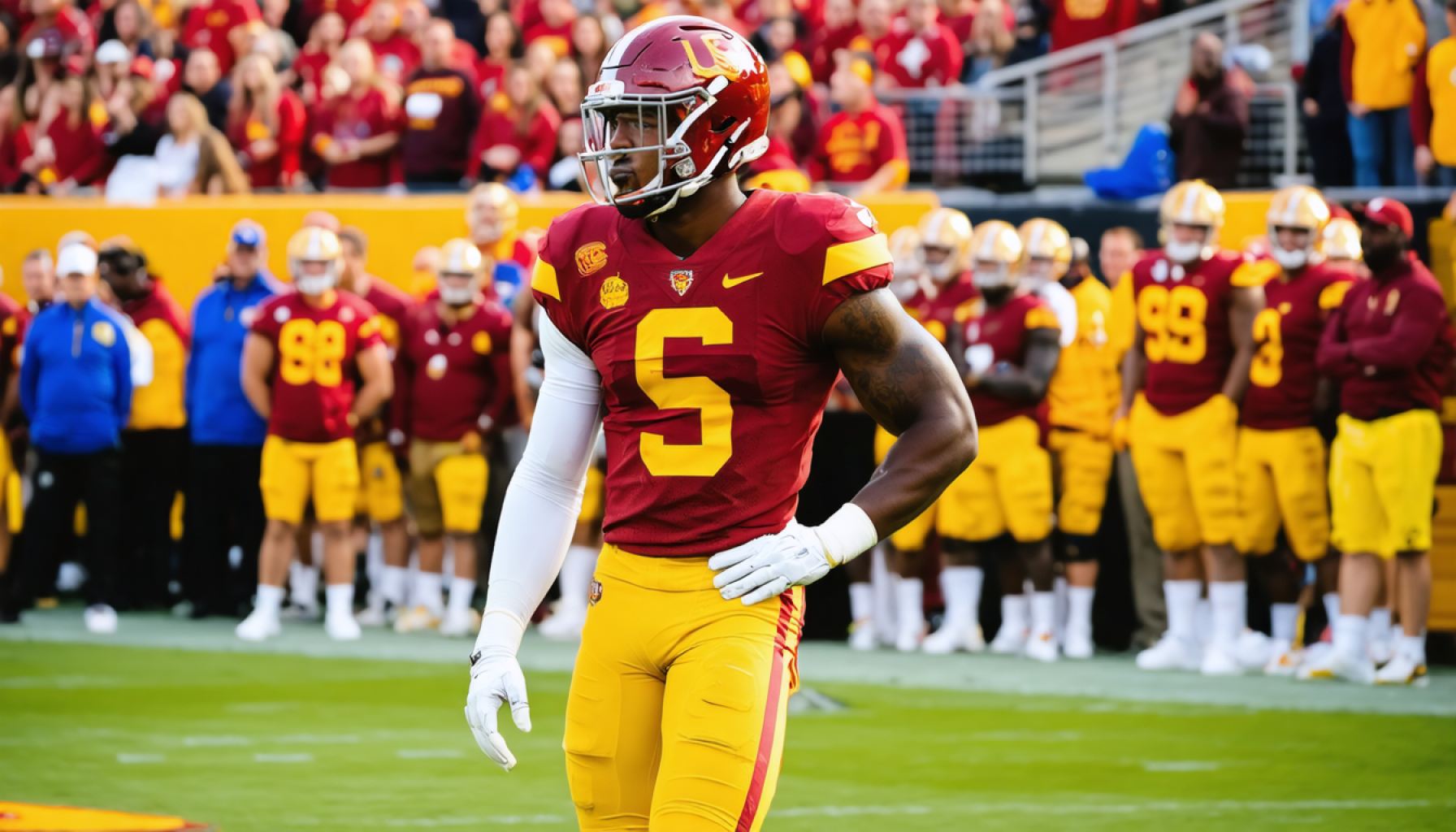
This image was generated using artificial intelligence. It does not depict a real situation and is not official material from any brand or person. If you feel that a photo is inappropriate and we should change it please contact us.
USC Excuses Threaten Notre Dame Rivalry Future Without Merit
- The historic USC-Notre Dame football rivalry, dating back to 1926, faces uncertainty due to recent changes in college football dynamics.
- USC’s move to the Big Ten introduces logistical challenges that could affect the continuity of this traditional matchup.
- Athletic Director Jen Cohen highlights concerns over cross-country travel and playoff pursuits as potential obstacles.
- Despite these concerns, the rivalry’s rich history includes 24 national championships and 15 Heisman Trophy winners.
- USC could jeopardize playoff ambitions by neglecting this century-old tradition, as the College Football Playoff structure changes.
- The USC-Notre Dame series represents college football’s enduring spirit, advising against abandoning such a legacy.
The historic clash on the gridiron between USC and Notre Dame, a beloved tradition since 1926, stands precariously on the brink as college football’s shifting dynamics challenge its continuity.
Amidst the swirling winds of conference realignment, USC’s athletic director, Jen Cohen, unveiled doubts about the future of this time-honored matchup. Although acknowledging its profound significance, her words hinted at a potential reevaluation of the game’s place in USC’s schedule.
While dreamily envisioning a continued rivalry, Cohen’s enthusiasm faltered quickly. The transition of USC into the Big Ten, with its sprawling geographic demands, now poses logistical conundrums. She cited the taxing cross-country treks and playoff aspirations as pressing hurdles. But these justifications feel tenuous at best. USC eagerly embraced the Big Ten’s allure, fully aware of the Midwest’s existing challenges, leaving the Pac-12’s remnants in its wake.
Nestled a mere two-hour drive from Purdue, where USC will face off this fall, Notre Dame looms as a formidable recent opponent, triumphing in 11 of their past 14 encounters. Conversations with Notre Dame linger in the air, yet USC seems paused at a crossroads, cautiously balancing athlete welfare against athletic tradition.
The rivalry has birthed legends, with its narrative featuring 24 national championships and 15 Heisman Trophy winners. The notion of discarding this century-old tradition could inadvertently impact USC’s playoff ambitions, particularly as the College Football Playoff structure evolves.
College football’s heartbeat resonates in its enduring rivalries. This series has not only endured countless upheavals but has come to embody the sport’s very essence. While USC embarks on a new Big Ten chapter, severing ties with its legacy is not the solution.
Will the USC-Notre Dame Rivalry Survive College Football’s Turbulent Waters?
Historical Context and Significance
The USC vs. Notre Dame football rivalry, a staple of college sports since 1926, is more than just a game; it’s a storied tradition bringing legendary moments and fierce competitive spirit. With 24 combined national championships and 15 Heisman Trophy winners emerging from these matchups, this rivalry is a cornerstone of college football history.
How Conference Realignment Affects Scheduling
Real-World Use Cases
The recent shift of USC into the Big Ten is more than a geographical transition; it changes dynamics across college football. The realignment could potentially add more prestigious matchups against other major Big Ten teams like Ohio State and Michigan, which are attractive for media rights and recruiting purposes.
Real-world Case: Historically, scheduling non-conference games against notable rivals was easier when universities were regionally aligned. In the Big Ten, USC may prioritize conference games that offer a direct path to the College Football Playoffs (CFP), threatening traditional rivalries like that with Notre Dame.
Market Forecasts & Industry Trends
With college athletics becoming increasingly driven by television deals, brands, and playoff structures, traditional matchups risk being sidelined for games that yield higher financial returns. Predictions suggest that the novelty of non-regional rivalries might wear off, pushing schools back towards time-honored matchups, albeit within a business-centered framework.
Security & Sustainability
Travel logistics and athlete welfare are growing concerns. Long-distance games like those required in the Big Ten increase travel time and costs, posing sustainability questions. Schools need to balance financial incentives with their responsibility to student-athletes’ well-being.
Controversies & Limitations
1. Logistical Challenges: Frequent cross-country travel may affect athlete performance and health.
2. Tradition vs. Modern Dynamics: There’s an ongoing debate about prioritizing lucrative deals versus preserving tradition.
3. Media Influence: As TV networks wield more power in scheduling, conflicts can arise between ESPN, NBC (Notre Dame’s broadcaster), and Fox (Big Ten games) over game rights.
Reviews & Comparisons
USC-Notre Dame games have consistently offered high viewership ratings compared to other interconference games, which could argue for preserving the matchup. In terms of performance, Notre Dame has won 11 of the previous 14 contests, adding to the competitive intrigue.
Actionable Recommendations
– For Fans: Stay active in discussions. Fan engagement impacts school decisions on game scheduling.
– For Schools: Consider a hybrid approach — balance tradition with new opportunities. Prioritize marquee rivalries in long-term scheduling plans.
– For Networks: Foster partnership models that benefit schools and preserve game tradition.
Quick Tips
– Monitor conference updates to stay informed about potential changes in matchups.
– Support your teams by attending games, as physical presence might signal the importance of traditional rivalries to decision-makers.
– Engage on social media platforms to voice your support for the continuation of favorite matchups.
For more insights on college football rivalries and dynamics, explore ESPN.